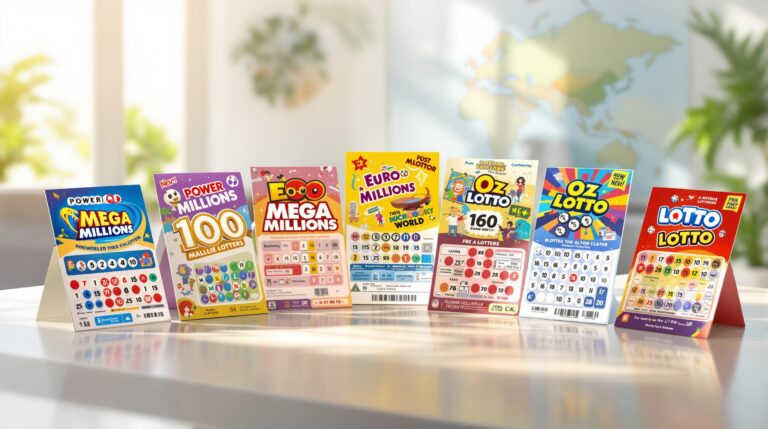- Hot and Cold Numbers: Use past draw data to choose frequently drawn numbers (hot) or rarely drawn ones (cold).
- Numerology: Pick numbers based on personal meanings like birthdays, life path numbers, or important events.
- Statistical Analysis: Study patterns, probabilities, and past results to create balanced number sets.
- Pattern Recognition: Look for recurring combinations or frequently paired numbers in past draws.
- Wheeling Systems: Generate multiple number combinations to increase coverage and chances of smaller wins.
Quick Comparison
| Strategy | Key Feature | Benefit |
|---|---|---|
| Hot and Cold Numbers | Focuses on frequency of past draws | Adds structure to picks |
| Numerology | Uses personal numbers or events | Adds a personal touch |
| Statistical Analysis | Analyzes probabilities and patterns | Brings a data-driven perspective |
| Pattern Recognition | Identifies recurring combinations | Highlights frequently paired numbers |
| Wheeling Systems | Creates multiple combinations from a set | Expands coverage for more chances |
While none of these methods guarantee a win, they make the game more engaging and organized. Play responsibly and enjoy the process!
Mathematician Breaks Down the Best Ways to Win the Lottery
1. Using Hot and Cold Numbers
A common way to choose lottery numbers is by analyzing how often numbers have appeared in recent draws. Hot numbers are those that show up frequently, while cold numbers are the ones that rarely make an appearance.
To use this method, you’ll need to dig into the draw history for your specific lottery game. Many people keep spreadsheets or rely on lottery analysis tools to track these trends. Here’s a quick overview of hot and cold numbers:
| Number Type | Description |
|---|---|
| Hot Numbers | Numbers that have been drawn often recently. Some players include 1-2 hot numbers, hoping the streak continues. |
| Cold Numbers | Numbers that haven’t been drawn much. Some believe these numbers are "overdue." |
| Balanced Approach | Combines hot and cold numbers for a more varied selection. |
But don’t get too fixated on hot numbers. As Lottometrix explains:
"Hot numbers impede your ability to pick the best lottery numbers to play based on the best patterns that appear most frequently in a lottery" [3].
Another thing to keep in mind: hot numbers are popular, so choosing them might increase the chances of splitting the jackpot if you win. A mix of hot and cold numbers can help reduce that risk.
While this method adds some structure to your picks, it won’t change the odds of winning – lottery draws are random. The real benefit here is giving you a system to follow. If you’re looking for something more personal, methods like numerology might appeal to you.
2. Picking Numbers Based on Numerology
Numerology offers a personal way to pick lottery numbers, connecting them to life events and personal significance. Unlike statistical methods, this approach allows you to add a meaningful touch to your choices.
For instance, if your Life Path Number is 7, you might lean towards numbers like 7, 17, or 27. However, keep in mind that commonly used numbers, such as birth dates, might lead to splitting the jackpot if you win. Combining numerology with other strategies can make your selections more diverse and interesting.
Here are some ways numerology can guide your number choices:
| Method | Description |
|---|---|
| Birth Dates | Numbers from important dates like birthdays or anniversaries. |
| Life Path Number | Calculated from your birth date to find meaningful numbers. |
| Personal Events | Numbers tied to significant moments in your life. |
| Pythagorean System | Converting letters in your name into numbers for selection. |
While numerology adds a personal layer to your picks, it doesn’t affect the lottery’s randomness. To make the most of this method, try to avoid limiting yourself to calendar numbers. Mix in less common numbers and consider combining numerology with other strategies for a broader range.
This approach can make the lottery experience more enjoyable, but if you’re after a more analytical method, exploring lottery statistics might offer additional insights.
sbb-itb-29f0076
3. Analyzing Lottery Statistics
Statistical analysis uses data to spot patterns and refine number selection. Instead of just focusing on "hot" or "cold" numbers, this approach dives into patterns, probabilities, and historical trends. Pairing it with other strategies, like wheeling systems, can help you build a more effective plan for choosing numbers.
Here’s how different statistical tools can guide your choices:
| Statistical Element | How to Use It | Key Consideration |
|---|---|---|
| Frequency Charts | Track how often numbers are drawn | Balance between hot and cold picks |
| Number Patterns | Identify common combinations | Steer clear of consecutive numbers |
| Probability Analysis | Use math to create balanced sets | Focus on even number distribution |
| Historical Trends | Study past winners for insights | Each draw remains random |
It’s important to note that past results don’t predict future outcomes, as every draw is random [1]. While statistics can offer useful insights, lottery draws are independent events [2].
Steps for using statistical analysis effectively:
- Collect accurate data: Use official sources for historical results.
- Analyze multiple patterns: Don’t rely on just one type of analysis.
- Combine techniques: Mix statistical insights with other methods for balance.
While statistical analysis can guide your decisions, remember that lotteries are fundamentally random. This approach works best when combined with other strategies, like wheeling systems, to improve your overall odds and coverage.
4. Finding Patterns in Past Results
Lottery tracking tools have made it easier to analyze patterns in past draws, offering insights that can guide your number selection strategy.
Here are two common methods for spotting patterns:
| Pattern Type | Description | Application |
|---|---|---|
| Frequency Patterns | Tracks how often certain numbers show up together | Helps identify frequently paired numbers |
| Temporal Patterns | Examines trends over time in past draws | Highlights recurring combinations |
As noted by the Lotto Alaska Blog:
"While every lotto drawing is random, looking at past winning numbers can help you identify numbers that appear more often."
To put this into practice, focus on these essential aspects:
- Time-Based Analysis: Study at least 50 previous draws to gather a meaningful dataset. This helps in identifying trends or recurring combinations.
- Number Relationships: Pay attention to numbers that often appear together. For instance, certain combinations have shown up repeatedly in games like PowerBall.
Be Aware of Pattern Limitations
Some strategies, like relying only on even-numbered sequences or focusing on narrow number ranges, can limit your chances. Patterns are best used as part of a broader strategy, which might include statistical analysis or numerology.
Lottery tracking tools make it easier to identify patterns by providing access to detailed historical data. Combining this with other methods strengthens your overall approach.
Next, we’ll dive into wheeling systems and how they can further refine your strategy.
5. Using Wheeling Systems
Wheeling systems provide a structured way to approach lottery picks, offering a method to create multiple combinations from a chosen set of numbers. The goal? To increase the chances of covering potential winning combinations.
| Wheeling Type | Description |
|---|---|
| Full Wheel | Generates every possible combination from your selected numbers. Best for players with bigger budgets who want maximum coverage. |
| Abbreviated Wheel | Produces a smaller set of combinations, guaranteeing wins if certain numbers match. Ideal for those on a tighter budget. |
| Key Number Wheel | Focuses on specific "key" numbers included in every combination. Perfect for players confident in the importance of certain numbers. |
For example, in a 6/49 lottery, you could pick 10 numbers and create multiple combinations of 6 numbers from this group. This approach relies heavily on selecting the right core numbers to improve your odds of smaller wins if key numbers hit.
How to Use Wheeling Systems Effectively
To get the most out of wheeling systems, focus on these key steps:
- Core Number Selection: Pick a mix of high and low numbers for variety.
- Combination Creation: Aim for balanced combinations that span different number ranges.
- Stick to Your Budget: Decide how many combinations you can afford to play without overspending.
Tips for Smarter Wheeling
Balancing cost and coverage is essential when using wheeling systems. While lottery tools can help generate combinations, avoid common mistakes like choosing too few core numbers or not creating enough variations.
For the best results:
- Select 8–12 core numbers for standard lotteries.
- Use software tools to ensure your combinations are mathematically sound.
This approach helps you make the most of your lottery strategy while keeping costs manageable.
Conclusion
Each lottery strategy offers its own way to approach number selection. While no method ensures a win, combining different techniques can create a more organized and thoughtful way to play.
Here’s a quick look at how these strategies can enhance your lottery experience:
| Strategy | How It Helps |
|---|---|
| Hot and Cold Numbers | Uses past draw data for insights |
| Numerology | Adds a personal touch to your picks |
| Statistical Analysis | Brings a math-based perspective |
| Pattern Recognition | Identifies repeating combinations |
| Wheeling Systems | Expands your number coverage |
"Winning the lottery is about playing with the best patterns that give you the best chance of winning" [3].
This quote from Lottometrix highlights the value of using a balanced approach that matches your preferences and budget. While these methods won’t promise a jackpot, they can make the game more structured and enjoyable.
To get the most out of your strategy:
- Stick to a budget
- Keep track of your results
- Stay updated on trends
- Avoid commonly picked combinations
Using tools like lottery analysis software can refine your approach while helping you stay grounded. Many successful players combine math-driven strategies, such as statistical analysis, with systems like wheeling, all while managing their spending carefully.




